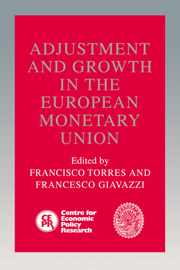Book contents
- Frontmatter
- Contents
- List of figures
- List of tables
- Preface
- List of contributors
- Foreword
- 1 Introduction
- 2 Economic and monetary union: critical notes on the Maastricht Treaty revisions
- Discussion
- 3 The design of optimal fiscal rules for Europe after 1992
- Discussion
- 4 Contracts, credibility and common knowledge: their influence on inflation convergence
- Discussion
- 5 Inflation in fixed exchange regimes: the recent Portuguese experience
- Discussion
- 6 Models of economic integration and localized growth
- Discussion
- 7 Shocking aspects of European monetary integration
- Discussion
- 8 Lessons of Massachusetts for EMU
- Discussion
- 9 Financial and currency integration in the European monetary system: the statistical record
- Discussion
- 10 Currency substitution: from the policy questions to the theory and back
- Discussion
- 11 Coordination of capital income taxes in the economic and monetary union: what needs to be done?
- Discussion
- Index
Discussion
Published online by Cambridge University Press: 29 January 2010
- Frontmatter
- Contents
- List of figures
- List of tables
- Preface
- List of contributors
- Foreword
- 1 Introduction
- 2 Economic and monetary union: critical notes on the Maastricht Treaty revisions
- Discussion
- 3 The design of optimal fiscal rules for Europe after 1992
- Discussion
- 4 Contracts, credibility and common knowledge: their influence on inflation convergence
- Discussion
- 5 Inflation in fixed exchange regimes: the recent Portuguese experience
- Discussion
- 6 Models of economic integration and localized growth
- Discussion
- 7 Shocking aspects of European monetary integration
- Discussion
- 8 Lessons of Massachusetts for EMU
- Discussion
- 9 Financial and currency integration in the European monetary system: the statistical record
- Discussion
- 10 Currency substitution: from the policy questions to the theory and back
- Discussion
- 11 Coordination of capital income taxes in the economic and monetary union: what needs to be done?
- Discussion
- Index
Summary
Most European citizens (outside Germany) take it for granted that monetary union can only be beneficial. This rosy picture of benefits of economic and monetary union (EMU) has been given a strong boost by the publication of a report by the Commission of the European Community entitled ‘One Market, One Money’. In this intellectual environment it is refreshing to read a paper like Paul Krugman's that contains a strong warning that EMU could also lead to great economic problems in the Community.
The essence of Krugman's argument can be summarized as follows. Increased market integration leads to more specialization of industrial activities. In a world of increasing returns, this is likely to lead to regional concentration of industrial activities. As a result, shocks in demand are more likely to have asymmetric effects, with some regions (and countries) being affected more severely than others. In addition, with free factor mobility, factors of production move quickly from the region (country) which is adversely affected towards regions (countries) that experience a positive demand shock. Thus, asymmetric shocks tend to have permanent effects on the growth rates of regions and countries. The implications for EMU are that the macroeconomic adjustment problem in a future monetary union will be intense, because countries will no longer be able to use the exchange rate as a policy instrument while they will be subject to more rather than fewer asymmetric shocks. The only way this adjustment problem can be made less severe is by centralizing a significant part of the national budgets so that the automatic inter-regional redistributive mechanism can play a role in the future EMU.
- Type
- Chapter
- Information
- Adjustment and Growth in the European Monetary Union , pp. 266 - 269Publisher: Cambridge University PressPrint publication year: 1993



